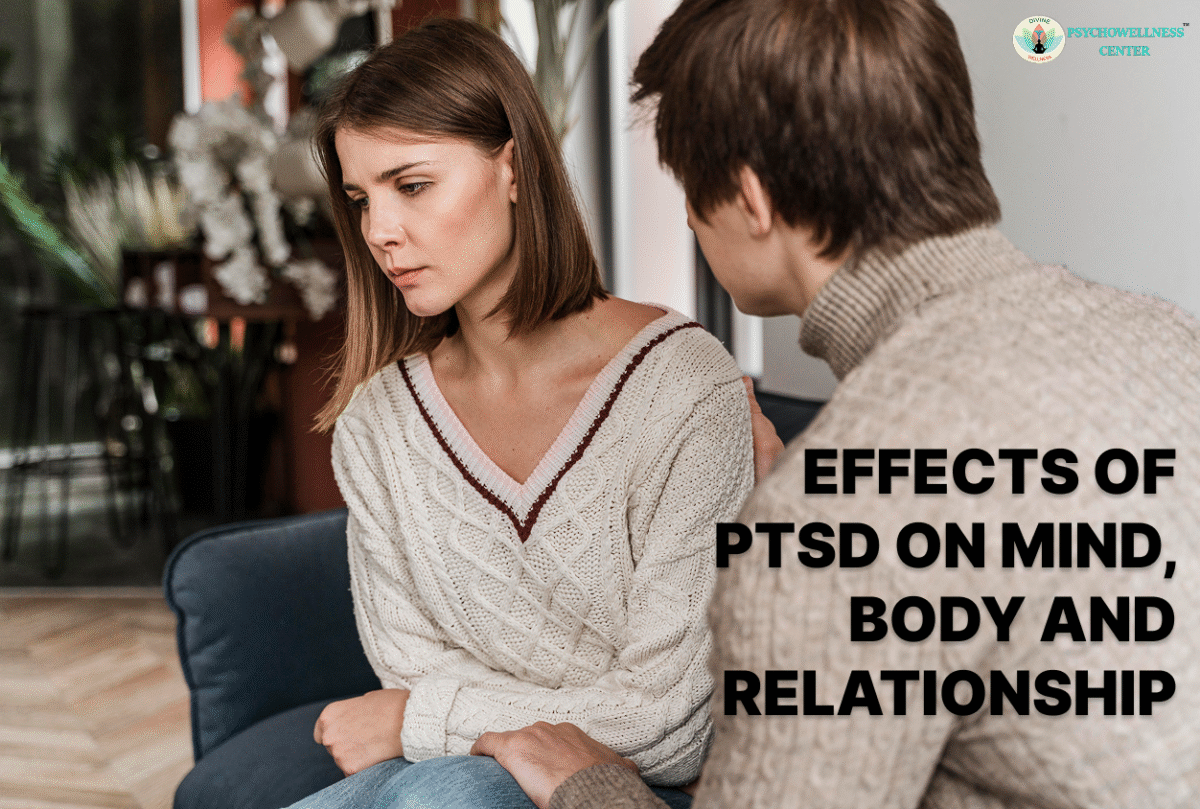Post-Traumatic Stress Disorder (PTSD) is more than just a psychological reaction to trauma—it is a complex mental health condition that significantly affects how a person thinks, feels, behaves, and connects with others. While it is often associated with military combat, PTSD can result from any distressing event—such as a car accident, abuse, natural disaster, or loss & grief.
Though PTSD is classified under anxiety disorders, its effects are far-reaching. It doesn’t just influence mental health but also has a profound impact on physical well-being and interpersonal relationships. Understanding these effects can foster empathy, reduce stigma, and promote healing.
Psychological Effects of PTSD on the Mind
Individuals with PTSD experience persistent and intrusive thoughts related to the traumatic event. These may come in the form of flashbacks, nightmares, or distressing memories that are difficult to suppress.
1. Cognitive Impairment
People with PTSD often struggle with concentration, memory recall, and decision-making. This cognitive fog, often referred to as “trauma brain,” is linked to dysfunction in the hippocampus and prefrontal cortex—regions involved in memory consolidation and executive functioning. According to neuropsychological studies, trauma can lead to measurable reductions in hippocampal volume, further affecting the ability to learn and retain new information (Bremner, 2006).
2. Hypervigilance and Anxiety
PTSD keeps the nervous system in a heightened state of arousal, also known as hyperarousal. This makes individuals feel constantly “on edge,” scanning for potential threats. The amygdala, the brain’s fear center, becomes overactive, causing irrational fears and panic attacks even in non-threatening situations.
3. Mood Dysregulation
PTSD can cause emotional numbing or intense mood swings. Individuals may feel detached from others, experience anhedonia (loss of interest in previously enjoyed activities), or be easily irritated and prone to angry outbursts. These emotional shifts are symptoms of the body’s attempt to protect itself, but can become maladaptive over time.
Physiological Effects of PTSD on the Body
PTSD is a mental health disorder, but it leaves a deep imprint on the physical body. Chronic exposure to stress hormones, such as cortisol and adrenaline, takes a toll on various bodily systems.
1. Nervous System Dysregulation
People with PTSD often live in a constant state of “fight or flight.” This dysregulation of the autonomic nervous system can lead to symptoms such as muscle tension, rapid heart rate, sweating, and gastrointestinal issues. A lot of people also suffer from somatic symptoms, which are physical pains that have no apparent medical explanation.
2. Weakened Immune Function
The body under chronic stress tends to have a suppressed immune system. Individuals with PTSD may be more prone to infections, chronic inflammation, and autoimmune disorders. According to studies, long-term stress affects white blood cell production, weakening the body’s ability to fight off illnesses (Yehuda, 2002).
3. Sleep Disturbances
PTSD’s hallmark symptoms include nightmares, insomnia, and frequent awakenings. Poor sleep not only affects mental clarity and emotional stability but also increases the risk of cardiovascular issues, obesity, and metabolic disorders. Restorative sleep is critical for brain function and emotional processing, and its disruption leads to further mental health decline.
Effects of PTSD on Relationships
The invisible wounds of trauma often manifest in interpersonal connections. PTSD affects attachment styles, communication, and trust—often leading to isolation, conflict, and emotional disconnection in relationships.
1. Avoidance and Withdrawal
To cope with overwhelming triggers, individuals with PTSD may isolate themselves, avoiding not only the reminders of the trauma but also the people associated with it. This can lead to strained family dynamics, reduced intimacy, and feelings of abandonment for both parties.
2. Difficulty with Trust and Intimacy
Individuals with PTSD may struggle to form or maintain intimate relationships due to deep-rooted fear of betrayal, judgment, or re-experiencing the trauma. This can lead to emotional numbing and an inability to be vulnerable with loved ones.
3. Communication Breakdown
PTSD can impair emotional regulation, making healthy communication difficult. Arguments may escalate quickly, or the individual may shut down entirely.
4. Impact on Parenting
Parents with PTSD may unintentionally project their anxiety, fear, or emotional instability onto their children. This can affect parenting style, attachment patterns, and the child’s emotional development. Children raised in an environment where PTSD goes untreated may develop anxiety disorders or trauma-related symptoms themselves.
Pathways to Healing: Addressing PTSD Holistically
Understanding the wide-ranging effects of PTSD is the first step toward recovery. Treatment must be holistic—addressing not just the mind, but also the body and the relational context in which the individual lives.
Evidence-based therapies such as Cognitive Behavioural Therapy (CBT), Eye Movement Desensitisation and Reprocessing (EMDR), and Trauma-Focused CBT have been highly effective in helping individuals reprocess traumatic memories and develop coping mechanisms.
Somatic therapies, mindfulness practices, and physical activity can also help release trauma stored in the body. Additionally, couples counselling, family therapy, and group support play a crucial role in rebuilding relationships damaged by PTSD.
If you’re searching for the best psychologist near me to begin your journey of healing from PTSD, centres like Psychowellness Center in Janakpuri and Dwarka Sector-17, Delhi, offer expert trauma-focused therapy and emotional support. For those who prefer privacy and convenience, platforms like TalktoAngel provide secure, online sessions with certified psychologists across India. Give 011-47039812 or 7827208707 a call to start the brave journey back to wellness.
Conclusion
PTSD is not a weakness—it is a human response to overwhelming pain. Its effects touch every part of a person’s life: their mind, body, and relationships. But healing is possible. With the right professional support, self-awareness, and a safe environment, individuals can move from merely surviving to truly living.
Contributed by Dr. R.K. Suri, Clinical Psychologist, and Ms. Mansi, Counselling Psychologist
This blog was posted on 23 September 2025
References
Bremner, J. D. (2006). Traumatic stress: Effects on the brain. Dialogues in Clinical Neuroscience, 8(4), 445–461. https://doi.org/10.31887/DCNS.2006.8.4/jbremner
Yehuda, R. (2002). Post-traumatic stress disorder. New England Journal of Medicine, 346(2), 108–114. https://doi.org/10.1056/NEJMra012941
American Psychiatric Association. (2022). Diagnostic and statistical manual of mental disorders (5th ed., text rev.; DSM-5-TR). https://doi.org/10.1176/appi.books.9780890425787
https://www.psychowellnesscenter.com/Blog/symptoms-and-treatment-for-complex-ptsd/
https://www.psychowellnesscenter.com/Blog/how-emotional-trauma-affects-physical-illness/
https://www.psychowellnesscenter.com/Blog/importance-of-safe-and-supportive-trauma-therapy-sessions/
https://www.psychowellnesscenter.com/Blog/subtle-sign-of-unprocessed-trauma-affecting-your-marriage/
https://www.psychowellnesscenter.com/Blog/understanding-ptsd-and-the-path-to-healing/
https://www.talktoangel.com/blog/relationship-ptsd
https://www.talktoangel.com/blog/is-my-past-trauma-affecting-my-current-relationship
https://www.talktoangel.com/area-of-expertise/post-traumatic-stress-disorder-ptsd
https://www.talktoangel.com/blog/life-after-trauma-understanding-ptsd
https://www.talktoangel.com/blog/reclaiming-your-identity-after-living-with-complex-ptsd

